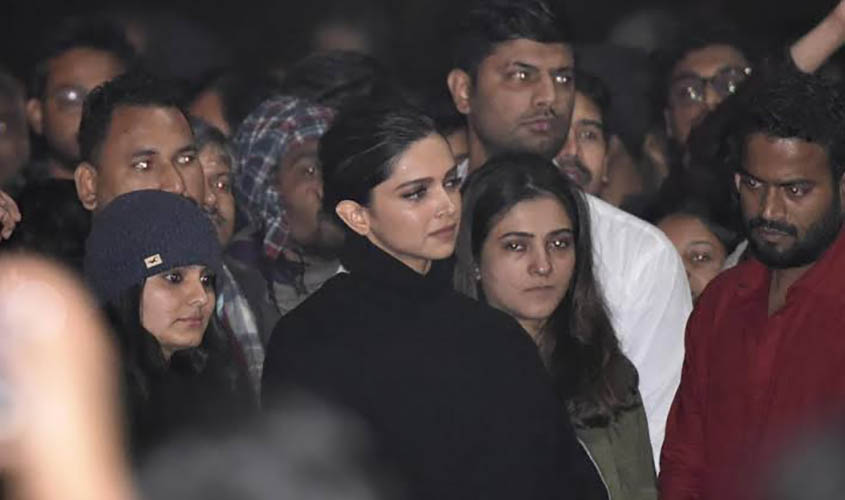Cine superstar and Bollywood diva Deepika Padukone displayed extraordinary courage and exemplary character when she visited the Jawaharlal Nehru University (JNU) campus to express her solidarity with students, who were victims of unprecedented violence unleashed by goons, allegedly under police supervision. The actress not only acted in a fearless manner, given the prevailing surcharged atmosphere, but made a point to fellow artistes that besides endorsing products and brands, they should also take a stand on vital issues confronting the people of this country.
In fact, Deepika took a leaf out of the book of what some of her yesteryear seniors had done during the closing stages of Emergency, to protest against the curtailment of civil liberties and fundamental rights. Dev Anand, decidedly one of the greatest mega stars of all time, whose style influenced multiple generations, came out in the open to express his indignation over the way in which India, at that time, was being run. Dev Anand was a top actor, perhaps the highest paid of that era, whose first day shows would always be blockbusters, regardless of how the film did subsequently; for him to take up cudgels on behalf of the oppressed was not an ordinary feat.
Dev Anand was not alone. Three other top actors—Pran, I.S. Johar and Shatrughan Sinha—joined him in opposing the authoritarian regime. The quartet was both vocal and minced no words in voicing what they had to say. Shatrughan Sinha is the lone survivor of that “Bollywood Revolt”. Incidentally, more than 25 years later, both Dev Anand and Pran were nominated for the Dada Saheb Phalke award for their contribution to the world of cinema. Their critics often questioned their political affiliations, but never comprehended that for these outspoken actors, the decision to be with the right, rather than with the wrong, was what only mattered.
When India got its Independence, the trio of Dilip Kumar, Raj Kapoor and Dev Anand, became the flag-bearers of the Hindi film industry. Dilip Kumar, perhaps, was the greatest actor of that period, and came to be known as the tragedy king of the silver screen. He was also a symbol of secularism in free India, given that he was a Muslim Pathan who had chosen to be in Bombay after the Partition. Raj Kapoor was immensely influenced by Pandit Jawaharlal Nehru’s socialistic outlook, and that was reflected in the movies produced and directed by him. It was not a mere coincidence that K.A. Abbas and several progressive writers were associated with the story and screenplay of his films.
In sharp contrast, Dev Anand carved out a quintessential style of his own emerging as a flamboyant hero, whose attire in his various movies dictated the fashion of the day. Coming from an Arya Samaj background, the actor rose to attain unprecedented heights. He also made path-breaking movies, and became emblematic of the change that the country was undergoing, even when he was well past his forties. He never shied away from calling a spade a spade, and that was in full-view when he lashed out against the Emergency.
Deepika Padukone’s expression of solidarity with the victims of JNU mayhem has to be seen in this context. She has had no political affiliations, and many years ago supported the idea of having a young leader for a young nation, and thus believed that Rahul Gandhi befitted that role. Having realised that this was not possible, she backed some schemes initiated by the BJP government including the Skill India programme. Deepika was never a political activist, unlike Shabana Azmi, who was always Left leaning in her views or the way, Swara Bhaskar is building her image.
Therefore she must have been most pained, like most Indians, to witness masked goons roaming freely on the JNU campus sadistically targeting students. The role of both the JNU administration as well as the Delhi Police has been deplorable as they permitted this bloodletting in the precincts of an educational institution. How can the brutality in JNU, and what happened a few days earlier in Jamia Millia Islamia, be wished away? The issue is not about ideology but about making our campuses safe for the students and the faculty.
The JNU Vice Chancellor, in particular, needs to render his resignation post haste. It goes without saying that he is unfit for the job and has failed miserably on all counts. His ouster has even been demanded by former HRD Minister and top BJP leader, Dr Murli Manohar Joshi. What is intriguing is why he continues to hold office given the fact that he is a source of exceeding embarrassment to the government.
The Delhi Police have never evoked this kind of criticism since the force has always been regarded as one of the finest in the country. It is evident that the present leadership of the police appears to have abandoned the responsibility of upholding the rule of law. There seems to be a total lack of coordination amongst top officers, and it is not an understatement to say that they lack professionalism. The main question is: why has there been an inordinate delay in booking the perpetrators of the JNU violence?
There is little point in singling out Deepika. She must be left alone. She has the right to say whatever she wishes to, in the same way as those who have chosen to remain silent. The issue is not of Left and Right, but that of Right and Wrong. Between us.

